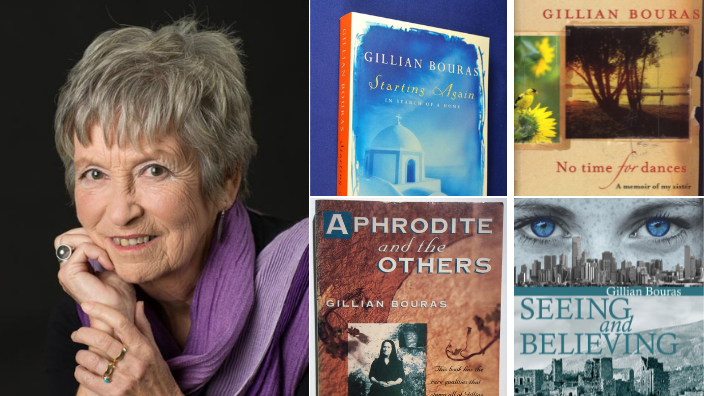‘I’ve always thought of life as being one long learning curve,” Gillian Bouras shares with me.
“Migration is a two-edged sword: loss and gain, so much more and so much less than we expect.”
Gillian Bouras is the award-winning Australian writer of eight books and several internationally-published articles who has called the Peloponnese ‘home’ for over 40 years. She is of Irish, Scottish, and English descent and was born in Melbourne in 1945.
There’s one word to encapsulate Bouras’ body of accomplished books. It happens to be the first, blaring word that pops up when you search her name: ‘expatriate’.
Gillian Bouras unexpectedly moved to the earthquake-prone coastal city of Kalamata with her husband George and two sons in 1980. The pair married in 1969 but an intended six-week holiday to Greece six years later marked the beginning and end for Bouras.
“Life became divided into before and after,” she says.
She left her life as an English school teacher after her husband George found a job while on the holiday.
George lived in Melbourne for 15 years prior but was “always homesick for Greece”, Bouras tells me.
“I can’t believe he was ever [in Melbourne],” she says.
Gillian admits she moved to Kalamata with “every advantage” but describes it as a “very gruelling experience.”
“I had not travelled anywhere outside of Australia at that point, and I was immediately struck by the poverty I saw,” she says.
She says she was confronted the “modest” lifestyles of the locals, disapproving attitudes towards women, widespread illiteracy, and the issue of the power of the church.
“There have been so many changes since then, of course,” she says.
Gillian published these early findings of life in a foreign country in A Foreign Wife in 1986.
It marked her literary debut, which Bouras counts among many of her regrets.
“…[I’ve] since been at a disadvantage in being separated from my Australian readership: I’m not in the country to give talks, put myself about, and so on,” she says.
Bouras goes on to say that “the tyranny of distance” between her and her eldest son, who returned to Melbourne twenty years ago, has also led to regret.
Bouras’ family is integral to her body of work.
Bouras’ matriarchal mother-in-law Aphrodite became the subject of her 1994 book Aphrodite and the Others. The book won the New South Wales Premier’s Award the same year and was shortlisted for the United Kingdom’s Fawcett Book Prize the year after.
“[Greek women like Aphrodite] taught that life can be lived well, no matter on what scale and in what circumstances,” Bouras writes in a Madonna Magazine article.
“She was a Greek village woman, illiterate, and irrevocably attached to her tradition way of life,” Bouras writes in The Courage of Fatih.
Gillian went on to explore the trauma over the suicide of her sister in the 2006 book No Time for Dances: A Memoir of my Sister.
On her experience writing No Time for Dances, Gillian says: “There may not be blood, but there [was] plenty of toil, sweat and tears. It [was] painful, and there [needed] to be an awareness of the staying power that will be needed.”
“Some people wished me well with No Time for Dances, but said they would never read it. But most writers who tackle sensitive issues are driven to do so: I certainly was.”
The book was shortlisted for the State Library of New South Wales’ National Biography Award in 2007.
Gillian Bouras has committed her literary career to capturing her experiences as an Australian migrant in Greece and, through these experiences, the essence of Greek family, life and culture. It prompted the National Library of Australia (NLA) to preserve an archive of Bouras’ work.
“This development [from the NLA] was a kind of affirmation, an acknowledgement that at least some people thought my writing was worth saving,” she says.
Through and through, Bouras is a Philhellene caught between two worlds.
“An expat always retains an attachment to their native land.”
She marked a departure from her non-fiction works with two children’s books in the early noughties, Saving Christmas in 2000 and Aphrodite Alexandra in 2007, but Bouras confesses that “fiction-writing is just about the hardest indoor sport”.
Today, Gillian Bouras contributes to Eureka Street, writes blogs on her website gillianbouras.com, frequently comments on Australian politics and society on her Twitter account @GillianBouras, and watches her five grandchildren grow up.


